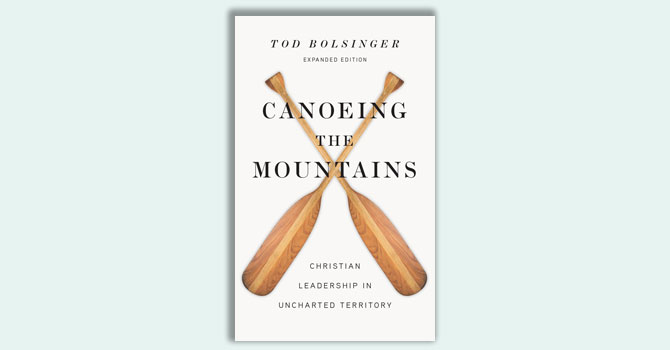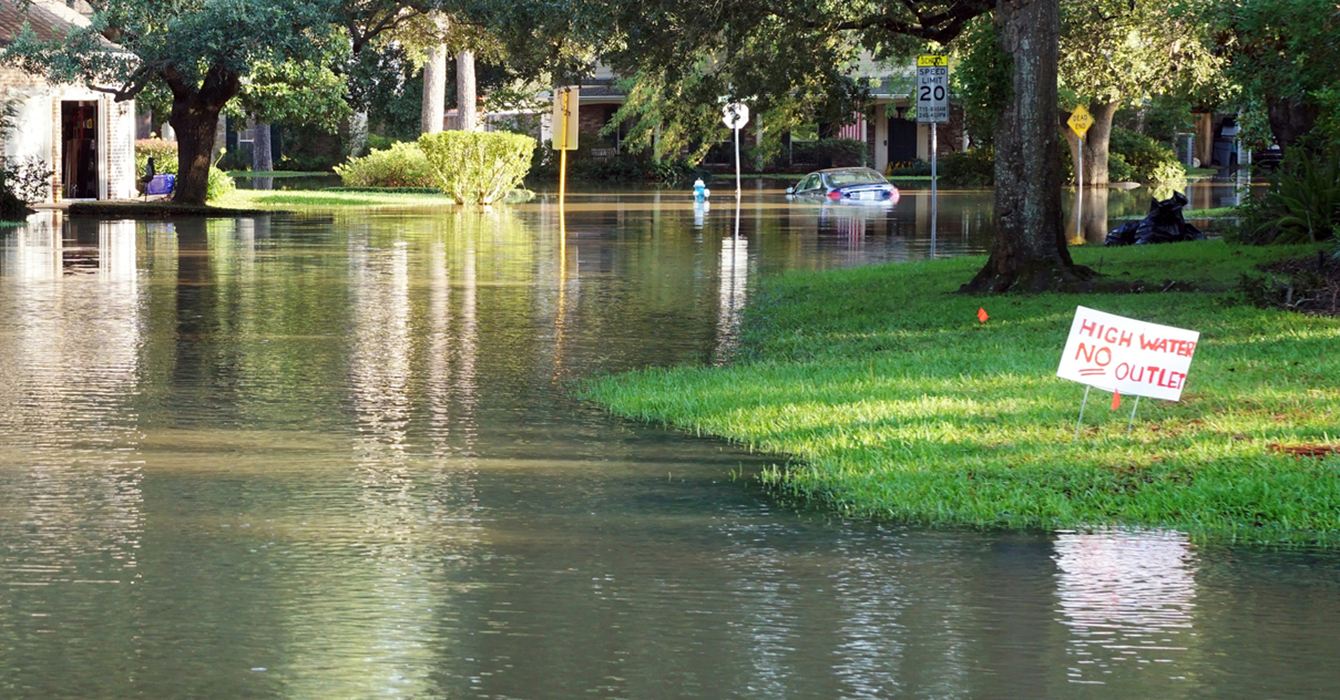When Lewis and Clark reached the Continental Divide, they expected to find a river that would allow them to paddle easily to the Pacific Ocean. What they saw instead were the Rocky Mountains.
That’s the type of challenge facing church leaders today -- so daunting, so new and so unexpected that the old solutions won’t work, says Tod Bolsinger, the vice president and chief of leadership formation and an assistant professor of practical theology at Fuller Theological Seminary.
“It’s not going to do you any good to paddle harder,” he said. “You have to make an adaptation, and the key to adaptation begins with going back to your deepest core value.”
In his book “Canoeing the Mountains: Christian Leadership in Uncharted Territory,” Bolsinger draws upon leadership theory as well as his experience as a pastor and seminary professor and administrator to offer a “trail map” for Christian leaders navigating a rapidly changing world.
 Bolsinger, who also has extensive experience as a leadership consultant and executive coach, has served Presbyterian (U.S.A.) churches in Hollywood and San Clemente, California.
Bolsinger, who also has extensive experience as a leadership consultant and executive coach, has served Presbyterian (U.S.A.) churches in Hollywood and San Clemente, California.
He spoke to Faith & Leadership about his book and the real hero of the Lewis and Clark journey (the only one who wasn’t lost): Sacagawea. The following is an edited transcript.
Q: Why did you use the metaphor of the Lewis and Clark expedition for the title and framing of the book?
For a while, it felt like everybody was saying the leadership issue was a “vision problem.” If you’ve got the right vision statement, you get the right compelling narrative, you get the right thing worthy of giving ourselves for, then we’ll go.
I began to recognize that leadership was more about capacity building, and I explained it to somebody this way. I was talking about Lewis and Clark, and I said that it’s more like a bunch of folks who are experts at river rafting coming face to face with a set of mountains that are bigger than their imagination could fathom.
It’s not going to do you any good to paddle harder. You have to make an adaptation, and the key to adaptation begins with going back to your deepest core value.
For Lewis and Clark, who were men of the Enlightenment, at a moment when they realized that their mission was a failure -- there was no water route [to the Pacific Ocean] -- they didn’t stop.
Because they had this deeper value that a growth of human knowledge would lead to a growth of human happiness. So more important than discovering a water route was discovering a whole new world.
For many people who are Christian, there are certain markers of success and certain measurements that we’re used to and certain strategies that go along with them. A moment of crisis takes us back to our deepest value -- there’s a reason for this journey to continue. It’s worthy of giving our lives for.
It’s way bigger than the size of our offering plates or our sanctuaries or the number of people in our pews.
There’s something about the way in which God wants to be made real in the world that we can embrace. It will motivate us forward and will teach us how to go through the painful process of learning and dealing with loss.
Of course, the title itself is an irony, right? It’s called “Canoeing the Mountains,” and the whole point, of course, is that you have to drop the canoes.
Q: All the canoeists out there must be disappointed when they get into it.
I can’t tell you how many places I’ve shown up where people have had a canoe on a chancel as a way of saying, “Look, we got a canoe because you were coming.”
I walk over and say, “These things are beautiful. Somebody built this. But this is worthless when you run out of water. Letting this go is our challenge. How do we stop being expert canoeists?
“Instead, become people who are humble learners who will work with new kinds of experts in a new day to learn new ways and new collaborations in order to keep moving.”
Q: What was the biggest lesson of the book?
The most important discovery of the book for me is embodied in the story of Sacagawea.
What we have here is this person who is a Native American, teenage nursing mother, who had been kidnapped as a child. She had no voice, no privilege, no power whatsoever, and she becomes the key to their being able to continue on. She wasn’t in unfamiliar terrain; she was going home.
I believe this is a model for the fact that the church will move forward the more we’re able to embrace that people who did not have power and privilege in a Christendom world are the experts.
If our institutions, our schools, our churches don’t create the places for those who were not formed in Christendom to be able to have not only a voice but influence and collaboration with people who are currently in power, I think we’ll never move forward.
The biggest adaptive change is for the dominant church to embrace that God has already been at work in the Majority World. And the immigrant communities, people of color and women -- particularly in our culture -- are the folks who are trained for the new world. They’ve lived in this uncharted territory already.
The reason why people who look like me are at the top of the food chain in organizations is because we were privileged 30 years ago. But the future doesn’t look like me. The future is going to look more like Sacagawea. How do we embrace that as a gift of God?
Q: You integrate a lot of leadership theories, including Ronald Heifetz’s. What was your challenge as a thinker and as a writer to adapting this to a church context? Because there can be resistance to “business stuff,” as you acknowledge in the book.
It is the single biggest criticism that I get from religious folks who are resistant to the change.
Ronald Heifetz is Jewish. Ed Friedman was a rabbi. One of my favorite most recent books is [former British Chief Rabbi Lord] Jonathan Sacks’ commentary on the Torah after having read adaptive leadership material. It’s called “Lessons in Leadership.” It’s beautiful. It’s just beautiful weekly readings on leadership.
But I think there is something really resonant in the Hebrew Scriptures that are part of the Christian backdrop. They allowed us to mine our own tradition, but with a different lens.
Yes, it is business, but it was also much more about organization and mission and communal life that allowed a different voice to speak into church life that would open us up.
It also has been really gratifying to watch people who have been trained in, say, organizational change theories all of a sudden see that they have something to contribute to their congregations.
It’s a “holding environment” between the pastor, who is the custodian of the tradition, who is trying to figure out, “What does a faithful adaptation of our core DNA look like?” and the skill set of business people, who say, “We have to do that exact same thing all the time in our careers in adapting to a rapidly changing world, and here’s how we can work together on this.”
For me, that’s been really gratifying, and it’s been helpful.
Q: It kind of reminds me -- we did a series on Faith & Leadership called “What’s Christian about Christian leadership?” In fact, Ronald Heifetz was one of the people we asked. So what’s Christian about the leadership advice and guidance you give?
Here’s what’s predominantly Christian. The very first thing to become an adaptive leader is you have to be a learner. We actually have a biblical word for that: the word “disciple,” the notion of being a committed learner who has to be humble enough to keep growing and be self-reflective.
The second part that is central to Christian faith is that leadership and transformation comes from loss. Every time I preach on this or speak about this, the New Testament text I use is out of John 12, where Jesus says, “The hour has come for the Son of Man to be glorified.” He then says, “Unless a grain of wheat falls into the earth and dies, it remains just a single grain; but if it dies, it bears much fruit” (John 12:23-24 NRSV).
So partly, it allows us to say, “Our Christian tradition believes that transformation comes through loss. The fruitfulness of giving up power or privilege so that something much greater than any individual can be birthed is central to what we believe.”
So I talk about loss and learning as central to adaptive leadership, central to the Christian faith.
You see this actually in the New Testament, right? There is not a rejection of our Jewish roots. There instead is a clear adaptation that now we have a new people of God who are made up of Jews and Gentiles who are meant for the same calling, which is the redemption of the whole world and the restoration of the creation.
What is the DNA that needs to adapt, and what is the DNA that is discarded? What’s the part of this living organism that has to change? The third part of the Christian faith that has to be central to adaptive leadership is discernment.
I say all the time, to every session group or board group or group leadership team, “Your fundamental practice is the practice of discernment. What of this do we hold on to because if we lose this, we stop being ourselves? What is it that we let go of because if we don’t let go of it, we will give up our opportunity to fulfill our mission?”
You see that in Lewis and Clark’s travels, but you [also] see it in every adaptive people, every system that thrives into a new change, whether it’s a business or organization or a community, a city, a church.
If you lose your core, deepest core identity, then you stop having something to offer the world. Bluntly, I think that’s the struggle right now in the mainline church.
Q: What do you see as the role of the seminary in leadership development?
One of the ways that I think about this in the seminary is this: Seminaries’ roots are in the spiritual formation of people who will be leaders for congregations and movements. That predates the institution, predates the higher education, predates the university.
In one sense, it’s going back and asking these questions about our core purpose, and I would say the purpose for seminary is ultimately leadership formation, spiritual leadership formation.
How do you raise up people to be Christians -- and in my case, Christian spiritual leaders -- who will be people of influence for the mission of God to go forward into the world? What do you do in a diminishing market where fewer people need graduate degrees to do that?
There’s still, I believe, a dramatic need for scholarship and reflective practice, for educated clergy and educated Christian leaders, but in a much more diverse and globalized world where not every denomination requires an M.Div.
Some of the places in the world where the gospel is most vibrant, the leaders there would not meet the entrance requirements for Duke Divinity School or for Fuller Seminary. How does that recast our calling?
When there is less need for theological graduate degrees and more need for theological education, spiritual formation and leadership development, what does that require of institutions of theological higher education?
Q: What would a church look like that follows your advice? How would that look on the ground?
The struggle is that you have to create an urgency to keep changing without lurching to a quick fix that will take away the anxiety. A good leader is leading the people through.
It’s a creation of a holding environment, a deeper sense of trust, an awareness and a reality of facing the changing environmental conditions, the changing world we’re in.
And then a capacity to begin to experiment your way forward, because we only learn through experimentation.
Churches that I work with that have had some degree of success do two things. No. 1 is as soon as they embrace this understanding of leadership, they stop lurching to quick fixes, which means that in one sense, everything slows down.
They also give up their denial, which means that everything keeps moving.
I think what you develop is a high degree of trust, a high degree of urgency, a lessening of anxiety. That’s kind of a paradox. That can show up in lots of different ways, and it shows up fundamentally as a reframe around our deepest core value.















